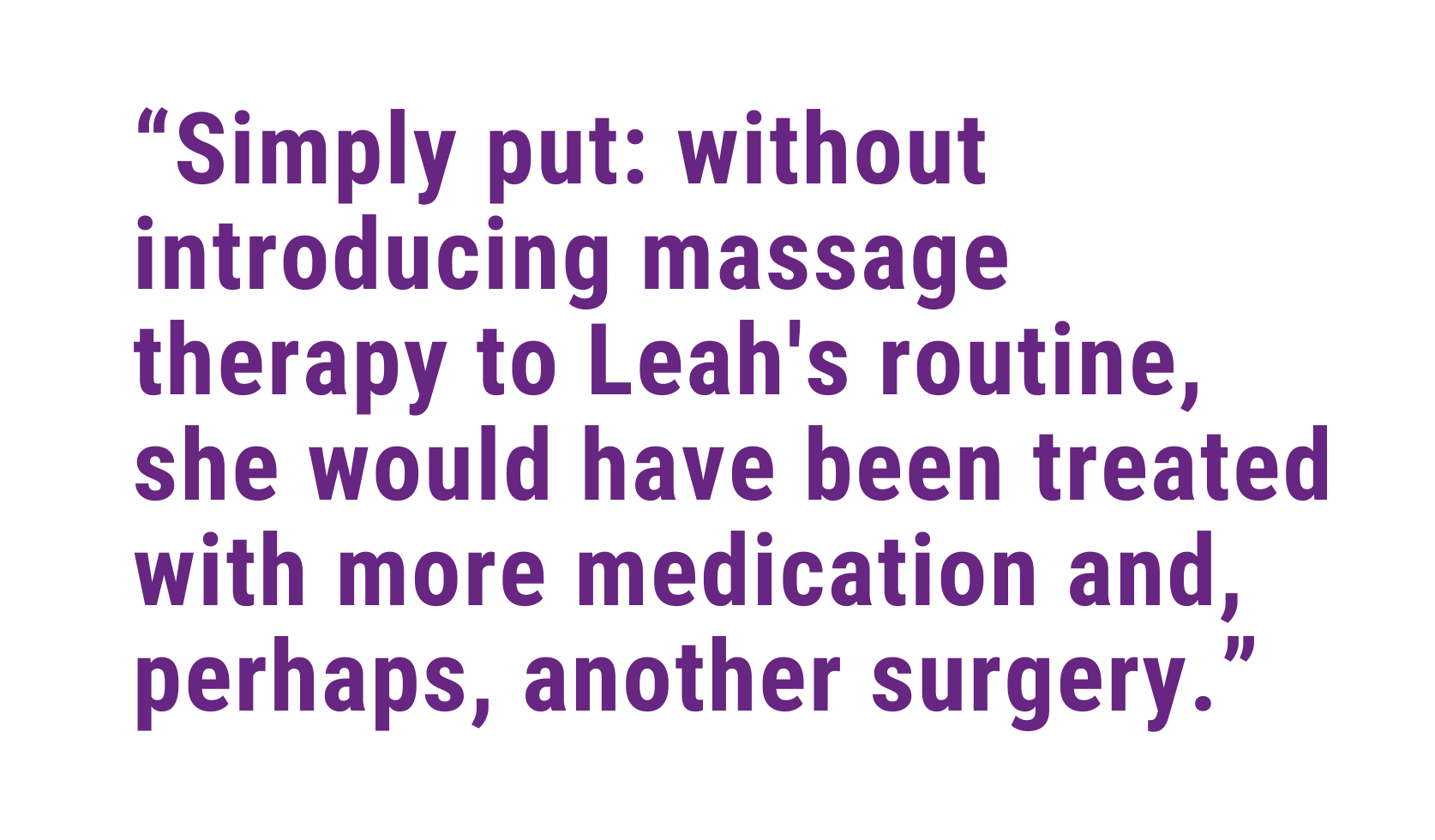RMTAO Blog
Leah's Story
BlogImage
Leah was born with spina bifida and hydrocephalus and she’s non-ambulatory (unable to walk without assistance), spending much of her time in a wheelchair.
Because she spends so much time in her wheelchair, she has issues with chronic constipation. Leah also has chronic kidney disease, with only 45% overall kidney function.
Leah had recently seen her nephrologist, and he had been concerned with the drop in her blood potassium and iron levels. Adding supplemental iron by medication was not ideal, because iron supplements are constipating, and Leah had been hospitalized in the past for constipation. She has even undergone surgery twice because of bowel obstructions.
After a conversation with his RMT, Leah’s father Matt became more interested in massage therapy as a possible way to help relieve her chronic constipation which might increase her appetite and get her interested in her favourite food again – hummus – which happens to be a natural source of potassium and iron.
 Their RMT performed some gentle abdominal massage treatments, and taught Matt how to incorporate some of these techniques into Leah’s daily routine at home.
Their RMT performed some gentle abdominal massage treatments, and taught Matt how to incorporate some of these techniques into Leah’s daily routine at home.
“I began incorporating these massage techniques every morning, along with some leg and mobility exercises, and within a couple of days her constipation was relieved. As I suspected, her appetite for hummus also returned,” Matt said. “Everything had returned to ’normal’. Three months later, during our quarterly appointment, her nephrologist was delighted to report that her potassium and iron levels had also normalized. He was stunned to learn our new routine.”
Matt sees massage therapy as an important addition to Leah’s health care. Some traditional medical interventions can be particularly traumatizing for Leah. For example, Leah’s veins are quite small and prone to collapse easily. Bloodwork is never easy for her, and intravenous iron supplements would include many potential complications.
“Massage has become part of a holistic health program in Leah's care. Specialized medicine - like nephrology and GI - is fine, but specialized medicine sometimes doesn't consider the ‘whole picture,’” Matt said.
Matt views massage therapy as a home-based solution that can treat Leah’s condition without surgery, medication, or other urgent medical care, and greatly improve her quality of life. Especially during the pandemic when she was one of the most at risk of serious complications from COVID-19, Matt found it important to give her as much treatment at home as he could to try and reduce the risk of infection and to keep her quality of life as high as it could possibly be.
“I'm convinced massage can help in other aspects of Leah's quality of life; living in a wheelchair can be physically demanding,” Matt said. “Her hamstrings are tight from sitting in a wheelchair all day, and she has several orthopaedic issues related to her spina bifida - such as hip dislocation, rotated tibiae, etc. - which, I'm certain, could be treated - not cured, but treated - with massage therapy,”
 Matt views massage therapy as a holistic approach to self-care, and he would recommend that others consider incorporating it into their health care. He emphasizes that doctors and specialists play their role in health care but treatments like massage therapy have an important role to play as well.
Matt views massage therapy as a holistic approach to self-care, and he would recommend that others consider incorporating it into their health care. He emphasizes that doctors and specialists play their role in health care but treatments like massage therapy have an important role to play as well.
“I think it's a common misunderstanding in the public that massage therapy is for a sore back or neck, but I'm confident our experiences will show that it goes far beyond that,” Matt said. “In our experience, massage therapy was a simple, natural solution which avoided new medications and/or urgent medical intervention.”
In Leah’s case, her regular abdominal massage helped treat her chronic constipation, which in turn improved her appetite, and her improved appetite and love for iron-rich hummus helped improve her blood chemistry and kidney function.
“Everything is connected: regulating her bowel function ultimately had a positive effect on her kidney function. Moreover, massage therapy presented a natural solution to multiple health issues without the need for medical intervention,” Matt said. “Simply put: without introducing massage therapy to Leah's routine, she would have been treated with more medication and, perhaps, another surgery.”
Regular massage therapy treatments can have impacts on other aspects of health as well as overall quality of life. Matt and Leah will continue with massage therapy treatments, not just to maintain her bowel and kidney health, but for her overall health and well-being.
“Massage therapy in Leah's case will not be a matter of fixing a single problem. I see massage therapy as a component of her holistic care,” Matt said.


